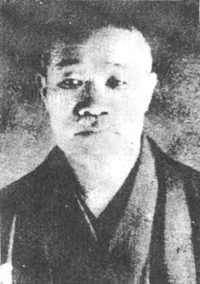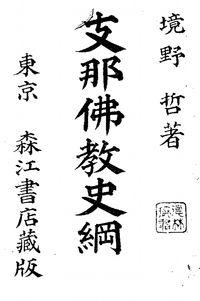Views
m (→Important Works) |
m |
||
| Line 17: | Line 17: | ||
Sakaino was a priest in the Ōtani sect 大谷派 of the Jōdō Shinshu 真宗 Japanese Buddhist tradition. As a child he read Inoue Enryō 井上圓了 (1858-1919) which sparked an interest in Buddhism, and later in 1894 he was involved with the periodical ''Bukkyō Shirin'' 佛教史林 (''Histories of Buddhism'') published by Murakami Senshō 村上專精 (1851-1929).<ref>For more on these and related figures, see James E. Ketelaar, "The Non-Modern Confronts the Modern: Dating the Buddha in Japan," ''History and Theory'' (Vol. 45, No. 4, Theme Issue 45: Religion and History, Dec., 2006):67-69. On Murakami see [http://ja.wikipedia.org/wiki/%E6%9D%91%E4%B8%8A%E5%B0%82%E7%B2%BE Japanese Wikipedia article on 村上專精]</ref> After studying at Tetsugakukan University 哲学館大學 (present-day Tōyō University 東洋大學) where he majored in Buddhist history, Sakaino lectured at Tetsugakukan and Sōtōshū University 曹洞宗大學 (present-day Komazawa University 駒澤大學). | Sakaino was a priest in the Ōtani sect 大谷派 of the Jōdō Shinshu 真宗 Japanese Buddhist tradition. As a child he read Inoue Enryō 井上圓了 (1858-1919) which sparked an interest in Buddhism, and later in 1894 he was involved with the periodical ''Bukkyō Shirin'' 佛教史林 (''Histories of Buddhism'') published by Murakami Senshō 村上專精 (1851-1929).<ref>For more on these and related figures, see James E. Ketelaar, "The Non-Modern Confronts the Modern: Dating the Buddha in Japan," ''History and Theory'' (Vol. 45, No. 4, Theme Issue 45: Religion and History, Dec., 2006):67-69. On Murakami see [http://ja.wikipedia.org/wiki/%E6%9D%91%E4%B8%8A%E5%B0%82%E7%B2%BE Japanese Wikipedia article on 村上專精]</ref> After studying at Tetsugakukan University 哲学館大學 (present-day Tōyō University 東洋大學) where he majored in Buddhist history, Sakaino lectured at Tetsugakukan and Sōtōshū University 曹洞宗大學 (present-day Komazawa University 駒澤大學). | ||
| - | In [[1900]] he founded the periodical '' | + | In [[1900]] he founded the periodical ''Shinbukkyō'' 新佛教 (''New Buddhism''), which was used as a platform for the ''Shin Bukkyō dōshikai'' 新佛教同志會 (New Buddhist Association) of which he was a member. Other members included Watanabe Kaikyoku 渡辺海旭 (1872-1933) who helped publish the Taishō canon [[大正新修大藏經]], and Takashima Beihō 高嶋米峰 (1875-1949), a scholar of Buddhism. |
{{incomplete}} | {{incomplete}} | ||
Current revision as of 20:48, 7 December 2014
Sakaino Satoru 境野哲 さかいの・さとる
(1871-1933) |
Known Associates:
|
|
Sakaino Satoru 境野哲 さかいの・さとる (1871-1933) was a prolific Japanese scholar and author of Buddhist history whose works were influential in China.
Contents |
Biography
Sakaino was a priest in the Ōtani sect 大谷派 of the Jōdō Shinshu 真宗 Japanese Buddhist tradition. As a child he read Inoue Enryō 井上圓了 (1858-1919) which sparked an interest in Buddhism, and later in 1894 he was involved with the periodical Bukkyō Shirin 佛教史林 (Histories of Buddhism) published by Murakami Senshō 村上專精 (1851-1929).[1] After studying at Tetsugakukan University 哲学館大學 (present-day Tōyō University 東洋大學) where he majored in Buddhist history, Sakaino lectured at Tetsugakukan and Sōtōshū University 曹洞宗大學 (present-day Komazawa University 駒澤大學).
In 1900 he founded the periodical Shinbukkyō 新佛教 (New Buddhism), which was used as a platform for the Shin Bukkyō dōshikai 新佛教同志會 (New Buddhist Association) of which he was a member. Other members included Watanabe Kaikyoku 渡辺海旭 (1872-1933) who helped publish the Taishō canon 大正新修大藏經, and Takashima Beihō 高嶋米峰 (1875-1949), a scholar of Buddhism.
| This section is incomplete and more content needs to be added. You can help by contributing text, images, or suggestions. |
Important Works
Note: This list uses traditional Sino-Japanese characters for book titles; other references may use the post-1946 shinjitai 新字體 forms.
- Shimbukkyō 新佛教 (New Buddhism) (periodical)
- Nihon bukkyōshi yō 日本佛教史要 (Essential History of Buddhism in Japan). 1901
- Indo bukkyōshi kō 印度佛教史綱 (Outline History of Buddhism in India). 東京: 森江書店, 1905
- Shina bukkyōshi kō 支那佛教史綱 (Outline History of Buddhism in China). 東京: 森江書店, 1907
- Hasshū kōyō kōwa 八宗綱要講話 (Lectures on Essentials of the Eight Schools). 東京: 丙午出版社, 1916
- Tendai shikyōgi kōwa 天台四教儀講話 (Lectures on the Outline of the Four Tiantai Teachings). 東京: 丙午出版社, 1919
- Shina Bukkyō shi kowa 支那佛教史講話 (A Discussion of the History of Buddhism in China). Tōkyō 東京: 共立社, Shōwa 2 (1927).
- "Zui Tō izen no Chūgoku bukkyō" 隋唐以前之中國佛教 (Chinese Buddhism before the Sui-Tang Period). Doctoral Dissertation, Komazawa University 駒澤大學, 1930
- Nihon bukkyōshi kōwa 日本佛教史講話 (Lectures on the History of Buddhism in Japan). 東京: 森江書店, 1931
- Bukkyō kenkyū hō 佛教研究法 (Method of Studying Buddhism). 東京: 大東出版社, 1931
- Bukkyō gaku gairon 佛教學槪論 (General Treatise on Buddhist Studies). 東京: 境野黃洋博士遺稿刊行會, 1936 (Published posthumously)
- 印度中國佛教史要
- 佛教史論
- 聖德太子之研究
- 戒律之研究
- 中國佛教史之研究
- 日本佛教發達概說
- 中國佛教精史
Notes
- ↑ For more on these and related figures, see James E. Ketelaar, "The Non-Modern Confronts the Modern: Dating the Buddha in Japan," History and Theory (Vol. 45, No. 4, Theme Issue 45: Religion and History, Dec., 2006):67-69. On Murakami see Japanese Wikipedia article on 村上專精
References
- Fóguāng Dictionary Editing Committee 佛光大辭典編修委員會, Fóguāng dàcídiǎn 佛光大辭典 (Foguang Dictionary) (Gāoxióng county 高雄縣: Fóguāng chūbǎnshè 佛光出版社, 1988), pp. 5767-8.
- Ketelaar, James E. "The Non-Modern Confronts the Modern: Dating the Buddha in Japan". History and Theory, Vol. 45, no. 4 (Dec., 2006), 68.
- Suganuma Akira. "The New Buddhism Movement and the Educational Idea of the Tetsugakukan--Sakaino Koyo and Takashima Beiho". Journal of Indian and Buddhist Studies, 49.1 (2000)
- Wikipedia (Japanese Edition), Article on 境野哲

